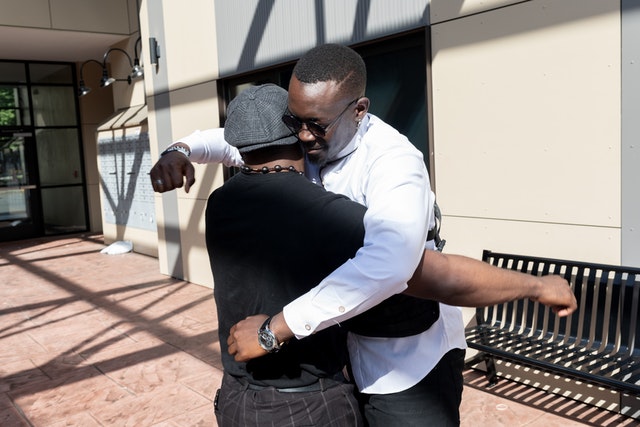Lesson 41 –
Philippians 4:1-9 NRSV
1Therefore, my brothers and sisters, whom I love and long for, my joy and crown, stand firm in the Lord in this way, my beloved. 2I urge Euodia and I urge Syntyche to be of the same mind in the Lord. 3 Yes, and I ask you also, my loyal companion, help these women, for they have struggled beside me in the work of the gospel, together with Clement and the rest of my co-workers, whose names are in the book of life.
4 Rejoice in the Lord always; again I will say, Rejoice. 5 Let your gentleness be known to everyone. The Lord is near. 6 Do not worry about anything, but in everything by prayer and supplication with thanksgiving let your requests be made known to God. 7 And the peace of God, which surpasses all understanding, will guard your hearts and your minds in Christ Jesus.
8 Finally, beloved, whatever is true, whatever is honorable, whatever is just, whatever is pure, whatever is pleasing, whatever is commendable, if there is any excellence and if there is anything worthy of praise, think about these things. 9 Keep on doing the things that you have learned and received and heard and seen in me, and the God of peace will be with you.
Background
Philippians is a letter written to a community in conflict. Elsewhere in the letter, you will find the writer urging people to “come together” and “be of the same mind as Christ.” This letter has been attributed to Paul. As you read in your own devotional period, consider what conflict looks like in your own family, community, household, church, country, and globe. Why is conflict so hard to address?
Today’s lesson will focus on managing conflict. Read the scripture out loud together.
Discuss with someone in your home. What does it mean for someone to be “messy?” “Dramatic?” “Always in something?”
What’s happening during this passage?
Paul writes to the church at Philippi. Before he even begins this part of the letter, he addresses the people as his siblings whom he “loves and longs for,” and as his “joy and crown.” He encourages Euodia and Syntyche to “be of the same mind.” He asks those who will read this to “help these women” because they have been actively engaged in the work “of the gospel.” He says, “rejoice in the Lord” and encourages the people to let their gentleness be known to all. After all, the Lord is “near.” Given all that is happening around Paul and the audience of this letter, he encourages them not to “worry about anything” but instead to take everything by “prayer and supplication” to God.
Paul tells the people to focus on whatever is “true, honorable, just, pure, pleasing, commendable.” This is a letter meant to inspire and push people to “keep on doing the things that you have learned and received.”
Who are Euodia and Syntyche?
We do not often hear from or about named women in leadership in the Bible. Here, we have proof that women were supporting the work of the gospel. In fact, many advocates for women in ministry refer to this passage to support gender diversity in Christian leadership roles. However, this passage is a bit sticky because it highlights the conflict happening among Christ-followers. Yes, even when led by women. We do not have much in this passage that tells us about these women, or what the conflict could have been, or even if it was their responsibility to handle it, or if this conflict was something related to them in the first place. What we do know is that there is conflict, and that these two women are major leaders in the Church-house movement.
This passage reminds us not to put anyone on a pedestal. People of all genders still must be accountable to the gospel. We all have to move in a principled way, whether it is your “fault” or not.
Why focus on the “pleasing” and “honorable” things?
We don’t know the details of what is creating a rift within the Jesus-movement. We don’t even know where the center of it resides. But we do know that there is one. Instead of ignoring it, Paul names it clearly. Paul encourages the people to focus on the good things. This is to be distinguished from “sweeping things under the rug.” Instead, Paul challenges this community to focus on their Why. Why follow Christ? Why join this community? Why are you here? To do so, Paul reminds the people to focus on whatever is true, honorable, just, pure, pleasing, commendable. Paul reminds the people to focus on the things that bring them back to the community.
In the middle of conflict, it can be easy to say, “you know what? I’m leaving.” And that is a valid expression of conflict resolution. Many people leave. A few weeks ago, we studied Christ’s call to deal with disagreement in the church (Matthew 18:15-20).
- Talk directly to the person who has harmed you.
- If they do not hear you, get a third party to mediate.
- If they do not hear you, go to the gathering of called-out citizens.
- If they still do not hear you, consider that person as someone who does not want to be in this community and move on.
But in order to go through this process, we have to first evaluate, is this the community we want to be part of? Paul challenges us to consider the benefits against the struggles. No community is perfect, but we get to decide if it’s worth struggling in. When we discern the value of a community, we think about the “whatever is true” and “whatever is pleasing.” These things hold us accountable to a community and compel us to make it stronger.
What questions do you still have of this scripture? How will you commit to journeying with this text this week?
 Connection to Today’s World
Connection to Today’s World
Micky ScottBey Jones is an educator, facilitator, and speaker. She wrote a poem called “Invitation to Brave Space,” which she uses in her travels across the globe. For Micky, this centering poem is one that honors the joy and challenges of community work. When she introduces this poem to people, she reminds them that “safe” space might not be something she can promise, but she can promise a “brave” space. Take a look at the poem below.
Together we will create brave space.
Because there is no such thing as a “safe somewhere and continue to grow.
space” —
We exist in the real world.
We all carry scars, and we have all caused wounds.
In this space
We seek to turn down the volume of the outside word
We amplify voices that fight to be heard elsewhere,
We call each other to more truth and love
We have the right to start
somewhere and continue to grow.
We have the responsibility to examine what we think we know.
We will not be perfect.
This space will not be perfect.
It will not always be what we wish it to be.
But
It will be our brave space together,
and
we will work on it side by side.
Journal: What conflict is most heavily on your heart today? Write down whatever details you feel comfortable seeing in print. Take this list to God in prayer this week.
Closing:
Stevie Wonder, Love’s In Need of Love…
Good morn or evening friends
Here’s your friendly announcer
I have serious news to pass on to every-body
What I’m about to say
Could mean the world’s disaster
Could change your joy and laughter to tears and pain
Love’s in need of love today
Don’t delay
Send yours in right away
Hate’s goin’ round
Breaking many hearts
Stop it please
Before it’s gone too far
Prayer:
Dear God,
You are the God of peace, even though we are a world of conflict. You are a God of understanding, even in a world of argument. You are a God of love, even in a world of hatred.
We need your love these days. We are so divided. The world is in need of love today. We need to hear from each other. We need to be heard. We need to listen. As tensions mount, give us the patience to pause and really hear from each other. We need to be able to trust each other. Help us to focus on what is good, and to name what is displeasing with clarity and conviction. In Jesus’ name we pray,
Amen
Works Cited:
https://onbeing.org/wp-content/uploads/2019/10/An-Invitation-to-Brave-Space.pdf





